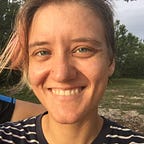A Letter to Young People Whose Parents Are Voting for Trump
If you are a young person, especially if you are too young to vote, let’s talk. Voting is in the news right now, but ethics, politics, and healthy community are about so much more than voting. In fact, voting is the very least of it. If we vote and return to our lives as passive bystanders, we have done very little. So, how do we decide how to act and what to act on?
I often encounter adults whose actions have been poisoned by hatred, people who fear and suspect anyone who doesn’t fit a mold. I wonder what it feels like in 2020 to be a teenager who is surrounded by people fueled by arrogance and fear.
Maybe your parents say racist things about protestors and victims of police violence. Maybe they refuse to denounce racism, or they deny its existence. Maybe they support politicians who are cavalierly offensive, bullies who’ve gotten famous through cruelty. Maybe your family finds their antics funny.
Maybe you are gay or transgender, gender-variant or bi. Maybe you attend a church that espouses homophobia. Maybe your church discriminates against women and uses scripture for exclusion. Maybe you’re simply a sensitive, empathetic person. And maybe the adults around you extinguish your tenderness because they are afraid emotions make you weak.
Maybe your family has certain expectations about what a girl or boy should be. Maybe your family doesn’t want you to date someone of a certain religion or race or gender. Maybe your family supports a public figure who has proven he does not care about truth.
You get to choose whether you think it’s okay to put children in cages. You get to decide whether we need to do something different to end poverty and homelessness. You get to choose whether you think prisons should be abolished and replaced with alternatives that address the root causes of harm. You get to choose how to interact with the flora and fauna around you. You get to choose what you think this government should pay for and what it should defund.
You have the freedom to develop your own viewpoints because you are a human. You are entitled to form your own opinions. Analyzing personal convictions helps us make decisions about how we live. If we do not find the time to do this crucial thinking, we might not understand our motives.
People who love you can also believe hateful things. If your own views or identities diverge from “the way you were raised,” your family may grow to accept you or they may not. Neither is the end of the world. When you establish where you stand individually, you will possess a unique integrity. Understanding your own deep viewpoints is a powerful kind of freedom. You will become a role model for people in your community in ways you may never know.
This year, hard conversations have bloomed about worker’s rights, truth, science, disability, gender, the environment, and the myriad ways racism is baked into the founding of this country. The truth is that we are moving forward collectively, but some people refuse to come along. They double down because of an overwhelming fear of change, a personal veto of new information, and — this is the hardest one for so many of us — a reluctance to say, “I’m sorry. Now, I see where I was wrong.”
Do your own research and engage with a variety of sources. There is a whole world of diverse viewpoints, beloved community, and fierce interest in expansion instead of atrophy. There are vast horizons of political philosophy beyond the Republican/Democrat binary.
Yes, voting is important. If you can vote, do it. This election is significant, but it is not the beginning or the end. Beyond casting a vote, what will you do to participate?
